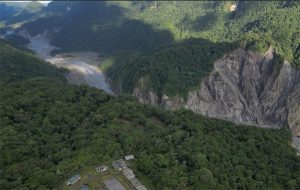
Mexican president Andrés Manuel López Obrador’s (AMLO) implementation of energy policies focused on “energy sovereignty” in Mexico has caused conflict with both the United States and Canada, as the northern countries argue that the promotion of Mexican state-run companies over private sector companies are discriminatory against international companies and do not abide by the United States – Mexico – Canada Agreement (USMCA) trade agreement (see 7/29 LADB).
Relations have been tense since the US’s announcement that it would “(demand) dispute settlement talks.” But in a meeting on Monday between AMLO and high-level US officials, including US Secretary of State Antony Blinken, AMLO indicated that President Biden had “responded to his concerns positively” and that there was “a different tone… a reaffirmation of respect for our national sovereignty,” reports Reuters. Officials were meeting as part of a High-Level Economic Dialogue (HLED), an annual meeting aimed at deepening economic ties between the two countries. US Secretary of Commerce Gina Raimondo was also present.
Separately, the countries also agreed to cooperate on the production of semiconductors and electric vehicles, especially through Mexico’s newly-nationalized lithium industry, according to AP. These efforts aim not only to strengthen supply chains in North America, but also to serve as an alternative to Asia’s current advantage in the semiconductor and battery market. Other topics addressed in AMLO’s Monday news conference included migration and promoting development in Mexico and Central America, Mexico’s high rates of violence, and the war in Russia and Ukraine, among others.
More Mexico
- Facebook groups created by women with the intention of tracking each other’s locations via WhatsApp have turned into a tool for women to combat the country’s reality of femicides and gender-based violence, reports Rest of World.
Argentina
- Argentine authorities have arrested a third person in connection to the attempted assassination attempt on vice president Cristina Fernández de Kirchner earlier this month, reports The Guardian. None of the three suspects arrested has yet been formally charged or entered a plea deal.
- Newly-appointed Economy Minister Sergio Massa, with little economic experience, is Argentina’s current hope to lead the country out of the economic crisis, writes Bloomberg. Massa’s presidential aspirations hinge on his success as minister.
- 12 of the 19 Venezuelan and Iranian flight crew members of the controversial plane that landed in Buenos Aires at the end of June were officially declared as able to leave the country by Argentine authorities, reports La Nación.
Bolivia
- “The Climbing Cholitas of Bolivia Warmis is a group dedicated to campaigning for the rights of indigenous women through mountaineering,” reports France24.
Brazil
- In a new statement, WOLA expresses support for “a bicameral resolution urging free, fair and peaceful elections in Brazil.”
- The Brazilian border town of Corumbá, next to Bolivia and not far from Paraguay, has become a crucial hub for cross-border smuggling, reports InSight Crime.
- Comparing two recent Bolsonaro and Lula rallies, Brian Winter at Americas Quarterly discusses the state of the presidential race and variations in polling.
- A new study from Instituto Fogo Cruzado and the Federal Fluminense University reveals that militias in Rio de Janeiro have expanded their territory by 387% over 16 years.
Chile
- “Higher temperatures and rainfall that weaken ice walls caused part of a hanging glacier to break off at a national park in Chile’s Patagonia region,” with such events becoming more frequent in recent years, reports Reuters.
Colombia
- Following the reestablishment of diplomatic ties between Colombia and Venezuela under newly-elected Gustavo Petro, Venezuela announced its agreement to serve as a mediator for any potential future talks between the Colombian government and the ELN rebel guerilla group, says France24.
Ecuador
- Ecuador is extending the state of emergency in Guayaquil and surrounding areas, reports Crisis24. The policy was initiated following a car bombing last month.
El Salvador
- Plans to develop a “$200-million solar energy plant to mine bitcoin” in rural Nueva Concepcion have divided locals, with environmental groups expressing concerns and others noting that “it could divert water that farmers need for irrigation systems, risking crop damage and loss,” reports Financial Express.
- At El Salvador Perspectives, Tim Muth outlines recent tweets from President Nayib Bukele. He writes, “For those who are Bukele critics, you can bookmark this page and come back to it in the future to highlight any unfulfilled promises. For those who are fans of Bukele, you can read this page as a description of what the future may hold. The videos also serve as examples of the sophistication of the Bukele message machine.”
Guyana
- Newswire reports on Guyana’s new Innovation Village, a project which “hopes to prepare citizens for a knowledge-based economy, foster a new tech startup scene, host innovative organizations from around the world and deliver the country a non-oil economy ‘sandbox’ that will provide local and global solutions.”
Migration
- The Fundación Vida Nueva, an organization under the supervision of the OAS, aims to rehabilitate migrants who have become amputees following accidents and attacks on the migratory trek, reports El País.
Nicaragua
- “As Nicaragua intensifies its crackdown on non-governmental organisations, Indigenous and Afro-descendant peoples on the country’s Caribbean Coast face increasing displacement and attacks from armed settlers with little help or oversight for rights violations,” says Right Livelihood and CEJIL to the UN Human Rights Council.
Regional
- “Latin America should be rethinking its dependency on fertilizer from Russia and elsewhere outside the hemisphere,” writes James Bosworth at the Latin America Risk Report, highlighting recent articles related to fertilizer use across the region.
Arianna Kohan y Jordi Amaral / Latin America Daily Briefing
http://latinamericadailybriefing.blogspot











